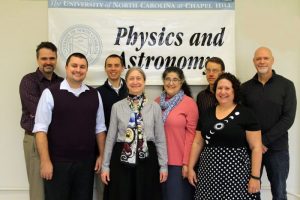The department of physics and astronomy in the College of Arts & Sciences at UNC-Chapel Hill has won an award for Improving Undergraduate Education from the American Physical Society. The award, which goes to no more than three of the 761 physics departments in the United States each year, recognizes departments who use the best practices for teaching physics and achieve excellence in the education of undergraduates.
The department of physics and astronomy received this award because of its successful multi-year effort to boldly restructure its introductory physics courses. From 2004 to 2014, with funding from the National Science Foundation and the Association of American Universities, the department completely transformed all aspects of these courses, as well as how instructors are trained to teach them.
In awarding this honor, the American Physical Society notes that the department “provides high-quality learning environments for about 200 physics majors and minors and 4,000 students from other majors each year.” The comprehensive nature of this transformation makes it a model for institutional change, the society said.
Instructors in these courses now use the best teaching practices, as revealed by research into physics education. Students spend two-thirds of their class time each week in studio sessions in which they work in groups of three or four in a variety of active-learning exercises. These changes have led to dramatic increases in the students’ understanding of physics. The department also modified the content of the introductory courses to include modern topics such as relativity and quantum mechanics or, in the courses intended for students of life sciences, physics directly relevant to authentic biological applications that is not traditionally included in introductory physics courses.
To help faculty members learn modern teaching techniques, the department adopted a mentor/apprentice model of professionalism in which a mentor (a faculty member who has experience in the course and might have a background in physics education research) is paired with an apprentice faculty member, who might be relatively new to teaching (an assistant professor) or might be a senior faculty member who has taught for many years but always in a traditional format.
You can access the full article here: Physics and Astronomy Department wins National Teaching Award
The announcement of the award has been posted on the website of the American Physical Society: https://www.aps.org/programs/education/undergrad/faculty/awardees.cfm


